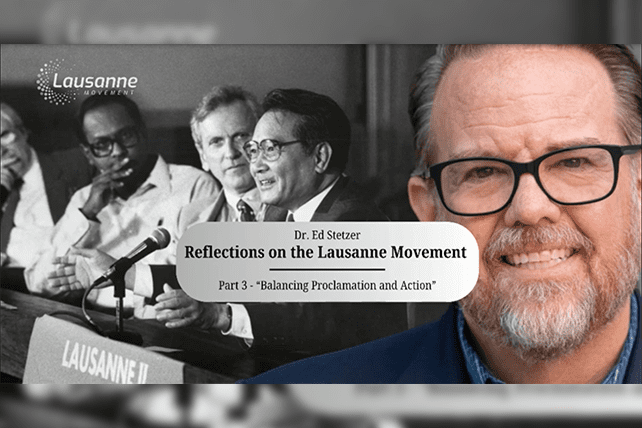When evangelicals from around the world gather for the fourth global Lausanne Congress (L4) in Seoul, Korea, we will once again grapple with an ever-present tension of evangelical mission. Evangelicals, like Christians for 2,000 years, will work through the relationship of the proclamation of the gospel in evangelism and the demonstration of the gospel through acts of mercy and justice.
In my role as North American Regional Director for the Lausanne Movement and as the dean of Talbot School of Theology, I’ve been able to engage this question with fellow leaders in the global church. Most evangelicals believe that both are essential to our mission, and I agree. So while I don’t speak on behalf of the entire movement, I want to share some thoughts on this tension, while reminding us not to lose our focus on evangelism.
The Historical Context: Lessons From the Past
The Lausanne Congress first gathered in 1974, responding in part to the failure of the “conciliar” missions movement. The conciliar missions movement takes its name from the “council” of the World Council of Churches and the International Missionary Council. These groups trace their origins to the World Missionary Conference in Edinburgh, Scotland 1910. That conference made a mistake by not forming a theological foundation, requiring only belief in “Jesus.” Many redefined “Jesus,” and emphasized social justice and transformation rather than the “traditional” missions focus of evangelical and church planting.
This shift concerned many evangelical leaders, including Billy Graham and John Stott, who were instrumental in founding the Lausanne Movement. That said, Graham and Stott ended up disagreeing on the exact relationship between gospel proclamation and gospel demonstration. Graham was a missiological “prioritist,” and Stott was a missiological “integralist.”
Graham worried about losing the focus or “priority” of evangelism. He believed that social concerns were important, but the church’s primary mission was proclaiming the gospel so that people would repent and believe (conversion). Stott, on the other hand, had been convinced by Latino theologians such as Rene Padilla of a vision of “integral mission.” Integral mission believes that both proclamation and demonstration are “integral” to the gospel.
The Ongoing Debate: Proclamation vs. Demonstration
The tension between “prioritists” and “integralists” remains within the evangelical world at large and specifically within the Lausanne Movement. Prioritists argue that the church’s primary mission is to proclaim the gospel and make disciples. Integralists believe that the gospel also compels us to engage in acts of mercy, justice, and societal transformation.
I often say that Christians are called to “share and show” the love of Jesus. I believe both sides of this debate are correct. That said, I’ve also often pointed out that every time the church fails to prioritize evangelism, it risks losing evangelism. History tells many stories of movements that started with a strong focus on evangelism but gradually drifted away and let other concerns take its place.
Evangelicals must realize that the world generally welcomes acts of mercy and justice yet resists the proclamation of the gospel. People are happy when Christians drill wells, rescue victims of trafficking, and provide for the needy. People push back when they hear that they are sinners, that Jesus’s death on the cross is the only way to salvation, and that they must repent and believe. Because proclaiming the gospel offends the world, Christians can be tempted to focus on the aspects of the mission that are more readily accepted by society.
Integral Prioritization: A Tentatively Suggested Approach
In a book I hope to release soon, I introduce the concept of “integral prioritization.” This term affirms both the prioritists and the integralists. I believe the mission of the church is both proclamation and demonstration, “sharing” and “showing.” But I also believe that if we fail to prioritize the proclamation of the gospel, we risk losing it within a generation.
Integral prioritization acknowledges the importance of mercy and justice, while insisting that evangelism must remain central in our mission. Mission is not an either/or endeavor, but a both/and one. At L4, I hope we renew a commitment to the mission—a commitment to both proclaiming the gospel and demonstrating its power through acts of mercy and justice. We must “share and show the love of Jesus.” But, I also hope we make clear that “when everything is mission, than nothing is mission.” Lausanne has, and I hope it will continue, keeping evangelism and church planting a priority, while (rightly) calling men and women to change their world.

